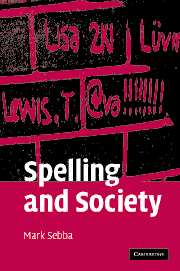Book contents
- Frontmatter
- Contents
- Illustrations
- Maps
- Diagrams
- Tables
- Acknowledgements
- Note on transcription
- 1 Map showing location of languages in Europe mentioned in this book
- 2 Map showing location of languages outside Europe mentioned in this book
- Introduction: society and orthography
- 1 Approaching orthography
- 2 Orthography as social practice
- 3 Language contact, linguists and the emergence of orthographies
- 4 ‘Postcolonial’ Orthographies
- 5 Between language and dialect: orthography in unstandardised and standardising vernaculars
- 6 Reform or revolution: where angels fear to tread
- 7 Why do we spell?
- Glossary
- References
- General index
- Index of language names
- Index of surnames
2 - Orthography as social practice
Published online by Cambridge University Press: 22 September 2009
- Frontmatter
- Contents
- Illustrations
- Maps
- Diagrams
- Tables
- Acknowledgements
- Note on transcription
- 1 Map showing location of languages in Europe mentioned in this book
- 2 Map showing location of languages outside Europe mentioned in this book
- Introduction: society and orthography
- 1 Approaching orthography
- 2 Orthography as social practice
- 3 Language contact, linguists and the emergence of orthographies
- 4 ‘Postcolonial’ Orthographies
- 5 Between language and dialect: orthography in unstandardised and standardising vernaculars
- 6 Reform or revolution: where angels fear to tread
- 7 Why do we spell?
- Glossary
- References
- General index
- Index of language names
- Index of surnames
Summary
A social practice?
In the last chapter, I introduced the idea that orthography, alongside literacy, required a social practice account. It is easy to see, once one has been introduced to the notion of a ‘social practice’, how a phenomenon like literacy can be studied in these terms. After all, taking part in the literate world involves doing things: signing a cheque, reading a bed-time story or collectively reading a wall newspaper. In the terminology of the New Literacy Studies, these are examples of literacy events which form, or form part of, literacy practices when carried out on a repeated basis within a particular setting and cultural framework. According to David Barton (1994: 37), literacy practices can be viewed as the ‘social practices associated with the written word’.
It is less easy to see orthography as a ‘social practice’. While clearly writing something – anything at all – involves using an orthography, is it not the act of writing, rather than the orthography, which is the social practice? The answer is yes and no: yes, writing is certainly a social practice, but no, it is not the case that orthography is merely a technology or instrument which is the means to engaging in that practice. In this chapter I shall explain why I view orthography itself as amenable to a social practice account.
There is in fact already a well-established sense of the term ‘orthographic practice’.
- Type
- Chapter
- Information
- Spelling and SocietyThe Culture and Politics of Orthography around the World, pp. 26 - 57Publisher: Cambridge University PressPrint publication year: 2007
- 1
- Cited by



